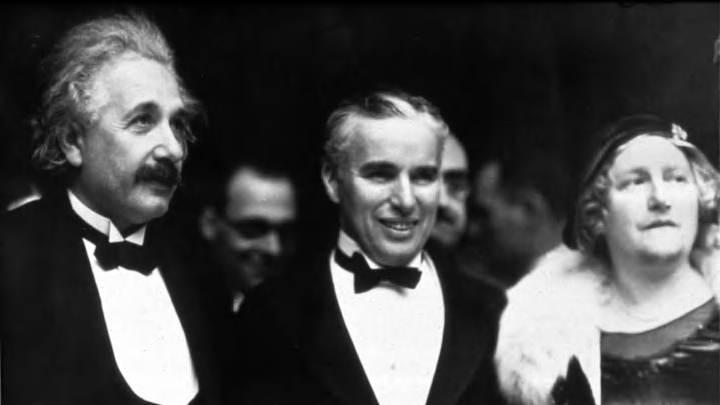Who would have thought that one of history’s most renowned geniuses and a slapstick silent movie star would hit it off? And yet they did.
Charlie Chaplin first met Albert Einstein on the famed physicist's second trip to America, in 1930-31, when he was invited to lecture at the California Institute of Technology. Einstein was then at the height of his fame, with newspapers tracking his every move and academics clamoring for explanations of his theories. Yet it was not fellow academics whom Einstein wanted to meet in California—it was a funny little tramp.
When Einstein arrived on American soil that December, he first spent a couple of days in New York—where he was feted and given the keys to the city—before traveling on to California. The scientist was known to be a massive movie buff, and the head of Universal Studios, Carl Laemmle, invited him to Hollywood to watch All Quiet on the Western Front (in his diaries, Einstein pronounced it “a nice piece"). Einstein also took the opportunity to ask the studio head to introduce him to Charlie Chaplin, whom Laemmle phoned shortly thereafter.
The first meeting between the great scientist and the comedy star took place at Universal Studios, where the pair took a tour and had lunch together. They hit it off straight away, sharing quick wits and curious minds. Chaplin later wrote in his autobiography of his early impressions of Einstein: “He looked the typical Alpine German in the nicest sense, jovial and friendly. And although his manner was calm and gentle, I felt it concealed a highly emotional temperament, and that from this source came his extraordinary intellectual energy.”
According to Chaplin’s autobiography, it was during the tour that Einstein’s wife Elsa bustled over, took him aside, and invited herself and her husband to Chaplin’s house. Chaplin was only too happy to oblige. He arranged an intimate dinner, at which Elsa regaled him with the story of when Einstein came up with his world-changing theory, sometime around 1915. She revealed that one morning, when she asked Einstein why he had barely touched his breakfast, he replied, "Darling, I have a wonderful idea." The scientist proceeded to sit and play the piano, stopping occasionally to take notes. Elsa could bear the suspense no longer and asked her husband to reveal all, but he said he needed to figure it out a bit more and soon retreated to his room. Einstein stayed in his room for two weeks, taking all his meals there, until he finally emerged, pale and tired, with his theory of general relativity written on two sheets of paper. He presented these to Elsa with a simple “That’s it.”
Chaplin and Einstein stayed in touch after that successful first meeting. The actor invited Einstein to attend his next premiere, for the movie City Lights (1931), as his special guest. As the tramp and the genius arrived together, both sporting black tie, the press clamored for photos and crowds went wild. According to popular legend, as the crowds cheered the pair, Einstein looked puzzled, and Chaplin explained, "They're cheering us both. You because nobody understands you, and me because everybody understands me." (Another version of events, from Chaplin's 1933-34 travelogue A Comedian Sees the World, says the line actually came from one of Einstein's sons, who uttered it while Chaplin was visiting Einstein in Germany about a month after the premiere: "You are popular [because] you are understood by the masses. On the other hand, the professor's popularity with the masses is because he is not understood.")
When Einstein came to California again in the winter of 1932-33, Chaplin decided to throw a dinner party in his honor. The comedian planned to introduce him to the great media mogul William Randolph Hearst, with high hopes of glittering conversation and witty repartee. Unfortunately, Einstein was not in the mood to explain his complicated theory to a non-academic audience, and Hearst, seemingly tongue-tied, took to playing with his dessert. An awkward silence fell across the table, which was finally broken when Hearst's mistress, the comedy actress Marion Davies, entwined her fingers in Einstein's famously unruly mop and quipped "Why don't you get your hair cut?"
It’s not clear whether the friendship survived the disastrous dinner to endure in the years that followed. Einstein renounced his German citizenship in 1933 and soon moved to Princeton, New Jersey, where his social circle widened considerably. But the existing accounts of their early meetings show that the two men shared, perhaps fleetingly, a deep understanding of one another—and their very different forms of genius.
